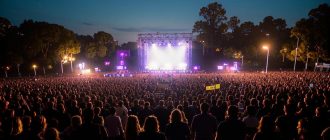Hosting major international competitions in a country tends to evoke ambivalent emotions among its inhabitants. While for millions of fans such events are a celebration, some locals actively oppose such events in their home country. We recall the biggest demonstrations against sports championships and find out what makes people protest.
Miami (USA) – 2021
So long ago the residents of Miami held a protest against the holding of the Formula 1 stage in the city, which will be held in May 2021. It’s all about the fact that the place of the proposed location of the track is surrounded by residential houses. People are concerned about noise, traffic and negative impact on the environment.
In addition to residents, local authorities have also expressed their discontent. Despite the fact that the main part of the track is planned to be located on the territory of the stadium “Hard Rock Stadium”, where the American soccer team “Miami Dolphins” performs, one of the streets of Miami will have to be closed for traffic during the race weekend. The city council is concerned about increased traffic and congestion in the area.
The organizers of the Grand Prix of Miami still believe that the race will have a minimal impact on local residents, as the stage of Formula 1 will be almost entirely on the territory of the stadium.
Tokyo (Japan) – 2020
This summer, about 200 people gathered in Tokyo, Japan to protest the 2020 Olympics. According to the protesters, the Olympics should be canceled worldwide because they create poverty and damage nature. Residents of Japan condemn the government for increasing the Olympic Games budget while some parts of the country were still recovering from the devastating 2011 earthquake and tsunami.
Moscow (Russia) – 2018
At the 2018 FIFA World Cup in Russia, the most “scandalous” was the fan zone on the territory of Moscow State University. More than 14 thousand people signed a petition against its opening. According to the protesters, the fan zone could interfere with the scientific and educational activities of the university, as well as harm the ecology of the Vorobyovy Gory preserve and the MSU park itself.
In addition, the main building houses a dormitory, which houses more than 6 thousand people, and the work of the site could violate sanitary standards for noise for residential premises.
The fan zone was not moved, but it was decided to move it 300 meters away from the university building, as well as to install noise screens and reduce the capacity from 40 to 25 thousand people.
Rio de Janeiro (Brazil) – 2014
In Brazil, protests against the 2014 FIFA World Cup turned into riots. Demonstrators smashed store windows, blocked the streets with barricades of torched tires, painted cars. Protesters even managed to break into the stadium, where the first match of the championship was to be held. As a result, the total number of protesters in the country reached 1 million.
However, in this case the locals were concerned not about the environment and noise, but about the very large expenditures of the state budget for the preparation and holding of the competitions: 8.7 billion euros were invested in the 2014 FIFA World Cup in Brazil.
Vancouver (Canada) – 2010
The organizers of the Olympic Games – 2010 in Vancouver had to spend a lot on security because of the protests in the city center.
The organizers of the demonstration were anti-globalization activists protesting against the games as one of the manifestations of globalization. The number of participants reached several thousand people, and the demonstration itself turned into a mass riot with throwing stones and rebar at the police. Protesters dressed in black, with masks on their faces, burned Olympic flags, smashed shop windows, painted walls and cars on the streets. Many were detained and arrested, so such actions were not repeated in the future.
Krakow (Poland), Davos (Switzerland) – 2022
But the residents of Krakow (Poland) and Davos (Switzerland) insisted on refusing to hold the Olympic Games in their homeland in advance, without bringing the situation to street actions. Special referendums were held, where people voted against the competitions, deciding that they did not need the Olympics.
The main reasons were the enormous costs and environmental problems.






